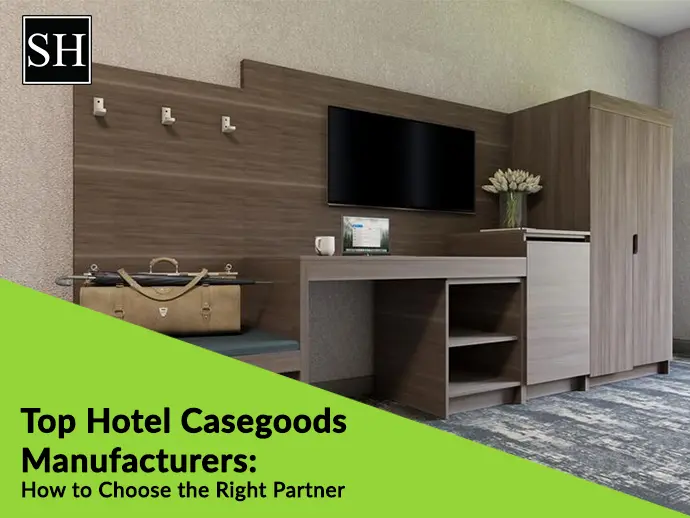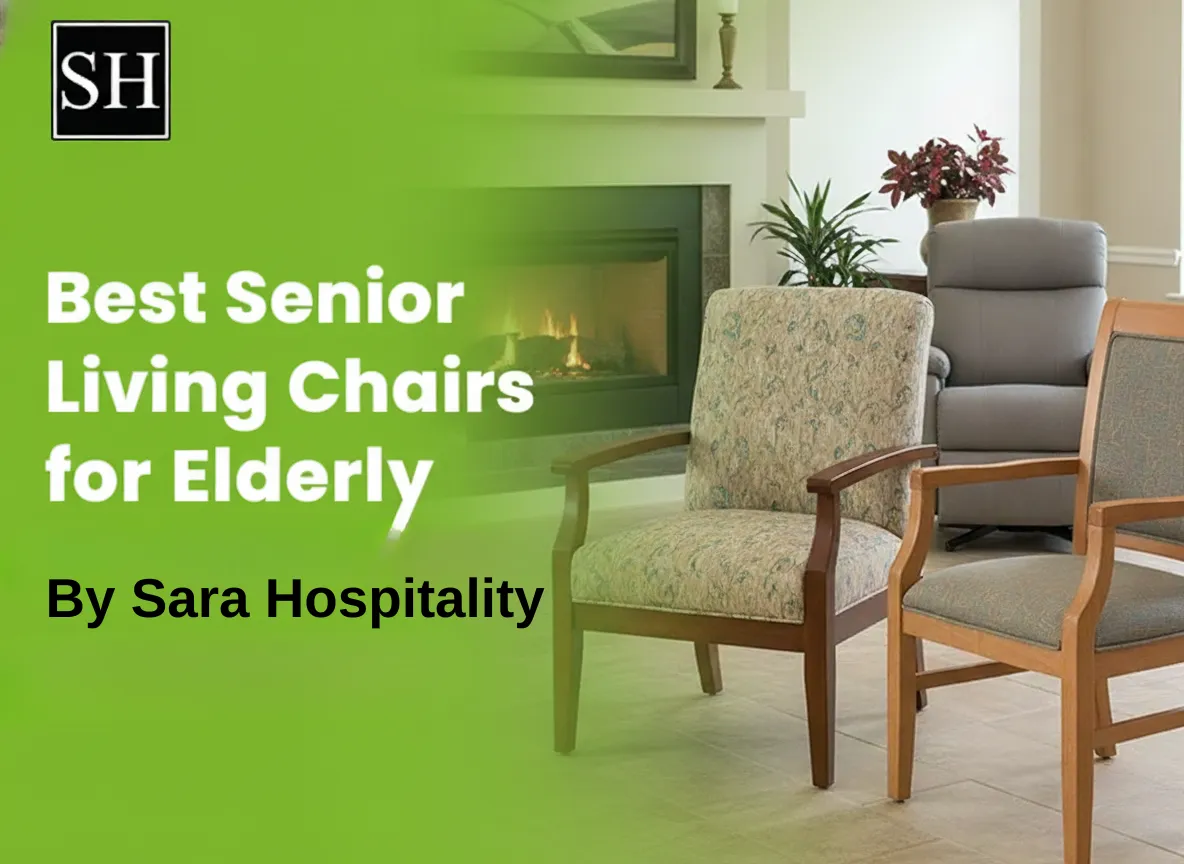
How to Choose the Best Hospitality Furniture Manufacturers in Canada
The furniture in a hospitality facility is so much more than function; it's a vital component that influences the guest experience, creates the ambiance, and quietly conveys brand identity throughout Canada. From the friendly hug of lobby seating to the utilitarian beauty of guest room casegoods, each piece adds to the story of the space. But making sense of the complicated landscape of possible suppliers is a major hurdle. Choosing the proper partner among the sea of hospitality furniture manufacturers in Canada is a long-term decision with significant implications. An educated choice affects not only the initial outlay but also long-term operation efficiency through wear and tear durability and maintenance considerations, ultimately impacting guest satisfaction and repeat visits.
This detailed guide offers a solid system for assessing and selecting the most suitable hospitality furniture manufacturer to meet your individual project requirements in the distinct Canadian environment so that your investment reaps long-term value and beauty. Being knowledgeable about this process is essential for every stakeholder in hospitality procurement.
Understanding Your Specific Hospitality Furniture Needs
Prior to setting out in search of the perfect furniture partner, gaining internal clarity on your project's unique needs is crucial. Having this initial step as a strong foundation guarantees effective dialogue with prospective manufacturers and coordinates expectations from the beginning. Skipping this phase frequently results in miscommunication, scope creep, and possible budget overruns in the future. To avoid these pitfalls, start by clearly defining your needs before choosing hospitality furniture suppliers Canada.
Defining Your Project Scope and Scale
Clearity begins with a clear definition of your project. Before you can even think about reaching out to hospitality furniture manufacturers in Canada, you must have good answers to quite a few specific questions. What type of venue are you furnishing—an upscale city hotel, a charming boutique motel, a busy restaurant, an upscale resort, or perhaps some combination of these? Place a quantity on the scale.
How many guest bedrooms are you outfitting? How many dining area or lounge chairs will you require? What specific types of furniture are you requiring? Create specific lists for casegoods (dressers, nightstands, desks), seating (sofas, armchairs, dining chairs, barstools), tables (dining, coffee, side), outdoor furniture, and specialty furniture. Also, identify the particular areas that require furniture: guest rooms, suites, lobby, reception, restaurants, bars, conference rooms, patios, pool decks, and corridors. A complete inventory forms the basis of your request for proposals later on.
Establishing Your Aesthetic and Brand Identity
Hospitality furniture is an effective medium for brand storytelling. It should be fully integrated into the broader design vision and architectural aesthetic of your property. Is the envisioned aesthetic modern and sleek, classically sophisticated, rustically cozy, one-of-a-kind boutique, openly opulent, or functionally utilitarian? The furniture choices should clearly reinforce this theme across the property, forming a consistent and lasting guest experience.
Inconsistency can weaken the brand message and provide a disjointed experience. Keep in mind the target audience and their expectations – furniture selections should appeal to the guests you want to welcome and retain.
Setting Realistic Budgets and Timelines
Financial planning and scheduling are essential limitations. Create a realistic budget that includes more than the initial cost of acquisition. Account for the total cost of ownership, which is meant to include anticipated lifespan, toughness against commercial use, possible maintenance charges, and replacement interval. In some cases, a greater up-front investment in quality translates into lower long-term costs.
At the same time, set realistic timelines. Other key determinants of the delivery schedules are the complexity of the designs selected, the amount of customization needed (stock versus fully custom), the current production capacity and backlog of the hospitality furniture manufacturer chosen, and shipping arrangements throughout Canada. Leave buffer time in your schedule for unexpected delays.
Identifying Durability and Performance Requirements
Unlike residential furniture, hospitality pieces are subject to constant use. Durability is not an option. Specify performance requirements. Think about materials: do solid woods need to be used, or are good-quality veneers or laminates adequate? What fabric wear ratings (e.g., Martindale or Wyzenbeek double rubs) are needed for heavily used upholstery areas? Construction methods count significantly – seek out heavy-duty joinery, reinforced frames, and quality hardware. Compliance with applicable fire codes and safety regulations in Canada is a requirement.
Additionally, take into account certain Canadian climatic considerations, particularly for outdoor furniture with requirements for resistance to UV radiation, moisture, and temperature changes. Performance expectations should be well communicated to prospective suppliers.
Key Qualities of Top Hospitality Furniture Manufacturers in Canada
After your needs are established, attention is then turned towards knowing the traits that make an outstanding manufacturer stand out from the rest. In looking for the top hospitality furniture manufacturers, there are qualities that always stand out as a mark of credibility, excellence, and partnership prospect. Such traits guarantee not just higher-quality products but an easier procurement and delivery experience as well — especially when seeking customized furniture solutions tailored to your brand and project vision.
Proven Industry Experience and Specialization
Furniture manufacturing in general is not sufficient; the need for specialization in the stringent hospitality industry is essential. Be on the lookout for manufacturers that have a proven history of being able to finish projects for resorts, restaurants, and hotels. Do they have an inherent comprehension of hotel brand requirements, the day-to-day operating issues with housekeeping and maintenance staffs, and guest comfort and aesthetic nuances? These are key indicators when choosing hospitality furniture supply companies in Canada that can truly meet industry-specific demands.
Their portfolio needs to highlight pertinent projects, preferably with installations in Canada, demonstrating their ability to perform in this particular market. A hospitality furniture company heavily ingrained in the business understands the specific pressures and demands unlike anyone else.
Design Capabilities and Customization Options
The capability to execute certain design concepts differs quite a lot across manufacturers. Get to know the differences: stock furniture has standard designs with possibly quicker lead times and reduced prices; modified-stock provides a little customization (e.g., finishes, upholstery) on basic frames; fully custom furniture means building truly one-of-a-kind pieces from your specifications.
For buildings that require a definitive brand statement or require solutions for atypical spaces, collaboration with custom hospitality furniture producers is most often priceless. Evaluate their in-house design assistance – are they equipped with designers who can interface with your staff, translate ideas, and supply strict shop drawings for approval? Strong design competency is the signature of top providers.
Quality of Materials and Craftsmanship
The durability and longevity of hospitality furniture depend on the material quality and craftsmanship skill. Review the manufacturer's method of selecting materials. Ask what types and grades of solid wood, veneers, metals, plastics, and laminates they use.
For upholstered products, find out about the foam densities and fabric options offered and confirm they are commercial grade. Seek physical indications of better construction methods: solid joinery strategies (such as mortise and tenon or dowel joint), strengthened stress points, uniform finishing, and a focus to detail. Inquire about their quality assurance procedures during production. Genuine top hospitality furniture makers take pride in flawless craftsmanship.
Manufacturing Capacity and Lead Times
A key logistical factor is whether the prospective hospitality furniture maker can realistically accommodate the volume and timeline of your project. Ask them directly about their production facilities – size, technology, labor force – and their usual output capacity. Be open with your project scale and needed delivery dates, and request candid assessment of their capability to deliver these. Ask for estimated lead times on similar projects, recognizing that levels of customization play a huge role in determining this. Confirm they possess effective project management systems to ensure production stays on track and communicate progress well.
Commitment to Sustainability and Ethical Practices
Today's marketplace, especially in Canada, requires being green and ethically sourced as a top priority for consumers and brands alike. Find out to what extent the company is dedicated to sustainability. Are they using sustainable material usage, like reclaimed wood or recycled metal? Do they have responsible material usage where they seek such certifications as FSC (Forest Stewardship Council) for wood-based products? What are their manufacturing processes in waste minimization, energy conservation, and the use of low-VOC finishes? Check for published environmental policies or supporting certifications. Working with someone who is devoted to ethical labor practices and environmentally friendly operations is an endorsement of your own brand values.
The Research Process: Finding Potential Manufacturers
With your requirements and the right attributes clearly in mind, the second step entails actively searching for shortlisted manufacturing partners. This research phase demands a multi-faceted strategy to cast as wide a net as possible in the first instance, then eliminate options based on initial research.
Leveraging Online Search and Directories
The internet is a valuable resource for preliminary research. Use good search techniques with focused keywords. A main starting point is searching for "hospitality furniture manufacturers in Canada." Narrow your search by including particular regions (e.g., "Ontario," "Quebec," "British Columbia"), the types of furniture required (e.g., "hotel casegoods Canada," "restaurant seating Canada"), or particular capabilities (e.g., "custom hospitality furniture manufacturers"). Outside of general search engines, use industry-specific online directories or databases. Organizations involved in Canadian furniture production, hospitality supply or interior design may have lists of member companies of good standing, giving a filtered starting point to determine a possible hospitality furniture producer.
Seeking Referrals and Recommendations
Word-of-mouth recommendations are important in the B2B market. Contact established industry colleagues – other hotel proprietors or managers, seasoned interior designers, hospitality specialists architects, or hotel group procurement experts. Ask them to share their good and bad experiences with different furniture makers. Specifically, ask about firms they've dealt with on Canadian projects. Suggestions from experienced authorities who have successfully allied with a leading hospitality furniture manufacturer can be a highly valuable shortcut in your research process and add authority to your initial list.
Analyzing Manufacturer Websites and Portfolios
After you have an initial list, research each company's website presence. A good, informational site is a minimum requirement. Carefully review their project portfolios or galleries. Check especially for samples of projects of similar size, style, and type as yours. Are there any Canadian projects listed? Check their client rosters—do they reflect good hotel brand names or independent properties? Study product information given – is it comprehensive in terms of materials and assembly? Look at their "About Us" or "Company History" pages to learn about their experience and specialization. Examine their claims made about capabilities in terms of design, customization, and manufacturing strength. This culls out manufacturers that are not suitable.
Vetting Your Shortlist: Due Diligence is Crucial
Having assembled a shortlist of potential hospitality furniture manufacturers in Canada, the due diligence stage is where things get critical. This is where you look past first impressions and marketing brochures to carefully assess each possible partner's fitness. Careful vetting reduces risks and the chances of a successful partnership and project outcome.
Requesting Proposals (RFPs) and Quotes
Make your request formal by sending out a detailed Request for Proposal (RFP) to your selected manufacturers. Your RFP should be detailed, covering the project scope, size, aesthetic direction, specific furniture lists with quantities, material and durability requirements, desired timeline, and delivery location details established earlier. Sending out the same detailed briefs to all contenders is essential to obtain truly comparable quotes and proposals. A comprehensive proposal sent by a potential hospitality furniture supplier should, in turn, encompass precise product details, itemized costs (covering any design or installation charges), well-defined manufacturing and delivery schedules, complete warranty details, and estimated shipping or freight charges. Ambiguous proposals are a warning sign.
Checking References and Client Testimonials
Never depend on the carefully selected testimonials or customer lists offered by the manufacturer. Ask for specific references for recent, similar projects closely matched to yours in scale, product type, and preferably location within Canada. Call these references directly. Draft targeted questions addressing their overall experience: Was the manufacturer communicative and reliable? Did the end product quality match expectations? Were deadlines met? How were challenges or problems resolved? Were there any surprise costs? Straightforward feedback from previous clients offers a wealth of information about the manufacturer's true performance and dependability, especially as to how they conduct themselves as a potential hospitality furniture manufacturer business partner.
Reviewing Product Samples and Mock-ups
Physical evaluation is necessary. Insist on witnessing and touching concrete samples of the suggested materials, finishes, joinery methods, and hardware. On upholstered pieces, ask for fabric samples and foam specimens. Evaluate quality, texture, and appearance personally. On more significant or extensively customized projects, seriously consider arranging a sample piece or even an entire model room mock-up. This enables you and your team (designers and operations personnel) to review the furniture in place, check out its functionality and comfort, and sign off the final design and quality prior to complete production. This process is especially important in using custom hospitality furniture manufacturers because it ensures they can convert concepts into reality perfectly.
Visiting Manufacturing Facilities
Though not always feasible because of distance or time limitations, touring the production facilities of your most serious competitors is the ultimate learning experience. A visit to the facility provides an opportunity to observe their quality control processes in practice, estimate the level of sophistication of their production equipment and technology, see the structure and organization of their workflow, and encounter important personnel aside from the sales staff, e.g., production managers or engineers. This first-hand glimpse instills faith in their capacity to produce consistent quality on the desired scale. This phase is particularly suggested for major investments or when involving custom hospitality furniture makers for complicated, bespoke pieces.
Understanding Warranties, Support, and After-Sales Service
Your relationship with your furniture manufacturer does not terminate on delivery. Read the warranty they provide with careful scrutiny. How long is it for? What exact components or flaws does it cover? What is excluded from coverage? Find out the process of lodging a warranty claim. In addition to the warranty, ask if they are serious about after-sales support. Do they supply spare parts if required in the future? Do they provide repair service, or do they refer to competent local technicians? Guaranteed long-term support is one of the essential considerations in the overall value proposition presented by leading hospitality furniture providers, so that your investment will be safeguarded for the future.
Specific Considerations for Working with Manufacturers in Canada
Selecting to collaborate with producers based in Canada presents unique benefits and entails particular considerations specific to the home market. Targeting your search to hospitality furniture producers in Canada can simplify processes and complement multiple business goals, accessing local expertise and logistical advantages.
Logistics, Shipping, and Import/Provincial Regulations
Domestic sourcing has major logistical advantages. Dealing with Canadian hospitality furniture makers generally involves shorter transport distances than dealing with foreign suppliers, which could mean lower shipping costs and quicker lead times. It bypasses the complexity, delays, and expense of customs clearance and overseas freight. Shipping schedules and coordinating them are usually easier. In addition, Canadian-based manufacturers tend to be familiar with national and provincial regulations that furniture may be required to comply with. This can include particular fire codes (with slight differences by province), accessibility standards (AODA in Ontario, for instance), and other safety regulations relevant to commercial settings, all of which they can ensure compliance with from the beginning.
Understanding the Canadian Market and Design Sensibilities
Producers based in Canada have a native knowledge of local market forces. They tend to be better aware of current Canadian design directions, regional taste sensibilities (which differ east and west), and the idiosyncratic demands of domestic travelers and hotel clientele. Such localized intelligence can prove crucial in validating furniture choices as properly appealing to the intended customers and the facility's geographic location. They are attuned to the subtleties which make Canadian hospitality different, and that can be brought to bear on more effective and apt furniture selection. This expertise is one of the advantages provided by many leading Canadian top hospitality furniture manufacturers.
Making the Final Decision
Following thorough research and careful vetting, it's time to select the winner. This should be an informed judgment on multiple parameters, transcending a single factor such as cost. Balance the information so far collected on product quality, design fit, manufacturing capacity, proven reliability, warranty and support provisions, and overall budget appropriateness. Highlight the principle of long-term value and possibilities of building a strong, cooperative relationship instead of settling for the lowest initial price. The self-assurance gained through complete verification of possible hospitality furniture manufacturers in Canada should be the motivation behind this important decision. Final inspection of the contract prior to signing is necessary, with particular focus on payment terms, guaranteed delivery dates, installation duties (if included), and resolution of disputes. Select the partner that can best guarantee delivering to your project's specific needs in a holistic manner.
Conclusion
Choosing the right furniture supplier is unambiguously a strategic move, deeply affecting guest experience, operational efficiency, and ultimately, the return on investment for any hospitality property in Canada. Selecting the perfect hospitality furniture company is not a matter of glancing casually at catalogues; it calls for intense due diligence, a clear vision of your particular project requirements, and an emphasis on long-term value.
By carefully adhering to the steps set forth in this guide – from scope definition and candidate vetting to taking the particular advantages of local sourcing into account – you prepare yourself to make an informed and assured decision. Taking the time and effort required to conduct this selection process sets the stage for successful project results and promotes long-term, positive relationships with leading hospitality furniture manufacturers who can help your vision become a reality.
- SOFT SEATING
- BATHROOM VANITY
- FIXTURE EQUIPMENT
- Hospitality Casegoods
- Hospitality outdoor furniture
- Senior living furniture
- Hotel reception desk
- High end contract furniture
- Premium Hotel Bedroom Furniture
- Custom commercial furniture
- Hospitality Furniture Manufacturers in Canada
- Leading Hotel Furniture Manufacturers in Canada
- Casegood manufacture canada
- Hotel Casegoods
- Cultured Marble
- SPC Flooring
CATEGORIES
-

How to Choose the Right Hotel Casegoods Manufacturers Partner
-

Best Armchairs for Elderly: A Hospitality Buyer’s Guide
-

Best Senior Living Chairs for Elderly In US by Sara Hospitality
-

Hotel Bedroom Furniture USA 2026: Design, Trends & More
-

What Is FF&E? FF&E Meaning & Hotel Furniture Installation Explained
RECENT POSTS










